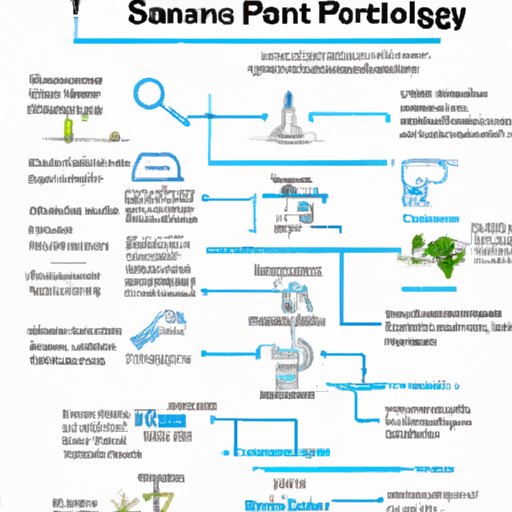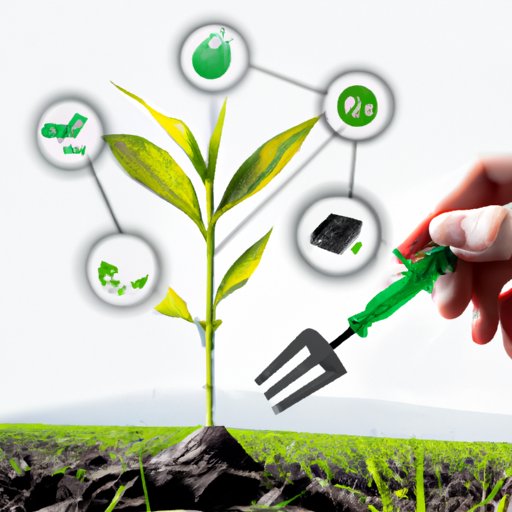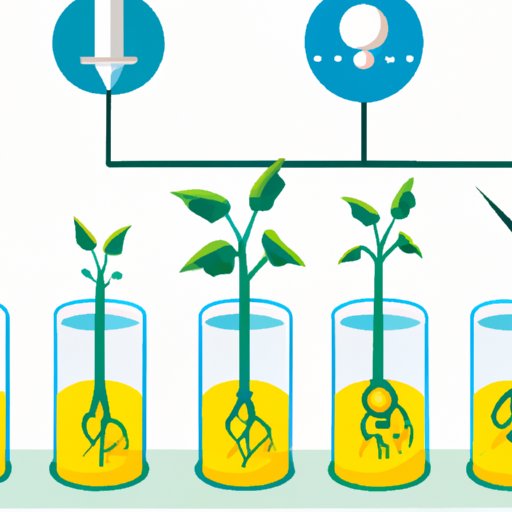Introduction
Plant science is a rapidly growing field that explores the diversity of plants and their many uses. It is an interdisciplinary field that combines elements of biology, engineering, chemistry, and other sciences to study plants and their interactions with the environment. Plant science has many important applications, including improving crop yields, developing new varieties of crops, and exploring the potential of plant-based medicines and nutrition.

A Comprehensive Overview of Plant Science
To better understand plant science, it is important to look at its definition, types, and areas of research.
What is Plant Science?
According to the American Society for Horticultural Science (ASHS), plant science is “the application of scientific knowledge to the study of plants and their interactions with the environment.” This includes the study of the structure, function, growth, development, reproduction, and evolution of plants. Plant science also encompasses the use of plants for food, fuel, fiber, and medicine.
Types of Plant Science
Plant science can be broken down into several distinct subfields. These include agronomy, which focuses on crop production; horticulture, which studies ornamental plants and landscaping; forestry, which deals with forest management; and botany, which examines the morphology and physiology of plants. Additionally, there are fields such as plant pathology, which focuses on diseases of plants; weed science, which investigates the ecology and control of weeds; and biotechnology, which uses genetic engineering to improve plant traits.
Areas of Research in Plant Science
Plant science covers a wide range of topics, including genetics, physiology, ecology, and biochemistry. Researchers explore how plants interact with the environment, how they respond to changes in climate, and how they can be used to address global challenges such as food security and climate change. Additionally, researchers are investigating how plants can be used to produce renewable energy sources, create new medicines, and improve water quality.
Exploring the Career Opportunities in Plant Science
Plant science offers a variety of job opportunities for those interested in pursuing a career in the field. From researching new varieties of crops to managing forests, there is something for everyone. But what kind of education is required to become a plant scientist? Let’s take a look.
Job Opportunities for Plant Science Professionals
Plant scientists may work in a variety of roles, from conducting research in a laboratory to working in the field. They may work for government agencies, universities, or private companies. Some of the most common job titles for plant scientists include agronomist, horticulturist, forester, botanist, plant pathologist, weed scientist, and biotechnologist.
Education Requirements for a Career in Plant Science
Most plant science careers require a minimum of a bachelor’s degree. Common majors include agronomy, horticulture, forestry, and botany. Additional education or experience in a related field, such as biology, chemistry, or engineering, may be beneficial. Additionally, some jobs may require specialized certifications or licenses.
The Benefits of Plant Science for Agriculture
Plant science has many applications in agriculture, from increasing crop yields to improving pest and disease resistance. Let’s take a closer look at some of the ways plant science is helping farmers and producers around the world.
Increasing Crop Yields
One of the main goals of plant science is to increase crop yields. Through the use of advanced breeding techniques, researchers are developing new crop varieties that are more productive and resistant to pests and diseases. According to a study by the International Rice Research Institute, the use of improved varieties of rice could lead to a 20% increase in yield and a 40% reduction in pesticide use.
Improving Plant Resistance to Pests and Diseases
Plant scientists are also working to develop crops that are more resistant to pests and diseases. This can help reduce the need for chemical pesticides and fertilizers, which can have negative impacts on the environment. For example, a study by the University of California found that genetically modified maize was able to resist the corn rootworm, reducing the need for chemical insecticides.
Developing New Varieties of Crops
Plant scientists are also developing new varieties of crops that are better suited to local climates and conditions. This can help farmers grow more diverse crops and reduce the risk of crop failure due to extreme weather events. For example, a study by the International Maize and Wheat Improvement Center found that new varieties of maize developed through hybridization were more resilient to drought and heat stress than traditional varieties.

Plant Science and Its Impact on Human Health
Plant science has many implications for human health, from plant-based medicines to plant-based nutrition. Let’s take a look at some of the ways plant science is improving our health.
Plant-Based Medicines
Plants have long been used in traditional medicines, but modern plant science is unlocking even more potential. Scientists are studying the active compounds in plants and using genetic engineering to improve their effectiveness. For example, a study by the University of Oxford found that a genetically modified version of artemisinin, an anti-malarial drug derived from the sweet wormwood plant, was more effective than the natural version.
Plant-Based Nutrition
Plant science is also being used to develop new varieties of fruits and vegetables that are more nutritious and better tasting. Through the use of genetic engineering and selective breeding, researchers are creating new varieties of crops that are higher in vitamins, minerals, and other nutrients. For instance, a study by the University of Florida found that a new variety of orange was richer in vitamin C than traditional varieties.
Plant Biotechnology
Plant biotechnology is a rapidly growing field that uses genetic engineering to improve plant traits. For example, scientists are using biotechnology to create plants that are more resistant to pests and diseases, and to produce plants with higher yields and better nutritional value. Additionally, biotechnology is being used to develop plants that can be used to produce biofuels, such as ethanol and biodiesel.

How Plant Science is Transforming the Environment
Plant science is having a major impact on the environment. From reforestation to improved water quality, here are some of the ways plant science is making a difference.
Reforestation
Plant science is being used to restore forests and other ecosystems around the world. Through the use of advanced breeding techniques, researchers are developing new varieties of trees and shrubs that are better suited to the local climate and soil conditions. Additionally, scientists are using biotechnology to create faster-growing trees that can help speed up the reforestation process.
Improved Water Quality
Plant scientists are also working to improve water quality. By studying the effects of different crops on water runoff and soil erosion, researchers are developing new strategies for reducing pollutants and restoring aquatic ecosystems. For example, a study by the University of Nebraska found that a cover crop of winter rye was able to reduce nitrate runoff from agricultural fields by up to 50%.
Carbon Sequestration
Plant science is also being used to capture and store carbon dioxide, a major contributor to climate change. Through the use of advanced breeding techniques and biotechnology, researchers are developing new varieties of crops that are better able to absorb and store carbon dioxide. Additionally, scientists are exploring the potential of using trees and other plants to create “carbon sinks,” areas where large amounts of carbon dioxide can be stored.
Cutting-Edge Research in Plant Science
As plant science continues to evolve, researchers are exploring new technologies and techniques to unlock the potential of plants. Here are some of the cutting-edge research projects being conducted in the field.
Genomics
Genomics is the study of the entire genome of an organism, including its genes, proteins, and other molecules. Through genomics, researchers are able to identify the genetic basis of traits such as disease resistance and yield, and use this information to develop new varieties of crops. Additionally, genomics is being used to study the evolution of plants and explore the potential of using plants to produce renewable energy sources.
Synthetic Biology
Synthetic biology is a relatively new field that combines aspects of engineering and biology to create new organisms with desired characteristics. For example, scientists are using synthetic biology to create plants that are more resistant to drought and heat, and to produce plants with higher yields and better nutritional value. Additionally, synthetic biology is being used to create plants that can be used to produce fuels and other industrial products.
Robotic Farming
Robotic farming is another emerging technology that is being used to improve crop yields and reduce labor costs. Through the use of robots, farmers are able to automate certain tasks, such as planting and harvesting, and monitor their crops in real time. Additionally, robots can be used to detect pests and diseases, and apply targeted treatments to specific areas of the field.
Conclusion
Plant science is a rapidly growing field that is having a major impact on agriculture, the environment, and human health. From increasing crop yields to developing new varieties of crops, plant science is transforming the way we grow and use plants. Additionally, cutting-edge research in the field is opening up new possibilities for the future, from genomics to robotic farming. Plant science has the potential to revolutionize the way we grow food and use plants for medicine, nutrition, and energy.
(Note: Is this article not meeting your expectations? Do you have knowledge or insights to share? Unlock new opportunities and expand your reach by joining our authors team. Click Registration to join us and share your expertise with our readers.)
